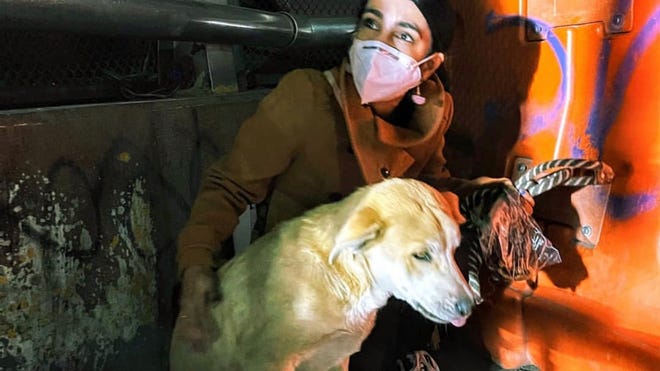EL PASO, Texas – They crossed the U.S.-Mexico border like beggars, tired, hungry and alone. They had no papers or names.
That was, until big-hearted border officers took in these destitute immigrants, who found new lives in America as Selma and Lieu, Petunia and Peanut, Cupid, Penelope, Selena and Floyd.
This border city sometimes called the Ellis Island of the Southwest has long been known for its generosity toward immigrants, and that spirit extends to newcomers on four legs.
For 12 years, a Borderland nonprofit called Bridge Pups Rescue has helped foster and adopt these accidental migrants into loving homes in the United States.
Founder Ruby Montana rescued her first “bridge pup” after her brother became a U.S. Customs and Border Protection officer in their hometown more than a decade ago. He noticed strays wandering over the international bridge from Ciudad Juárez, Mexico, into El Paso.

“They were usually in terrible condition, starving or limping or covered in fleas and ticks,” she said. “He would hide them; I would pick them up and find them fosters. When we got caught, we were scared the other agents were going to be angry, but they were totally on board. It became unofficial protocol.”
Technically, even dogs need documentation to cross into the U.S. legally. CBP enforces the rules set by the U.S. Department of Agriculture’s Animal and Plant Health Inspection Service and the Centers for Disease Control.
But if the dog has no human owner, there is often no one to stop a pup who follows his or her nose over the international bridge, or through the shallow water of the Rio Grande, or around the steel bollards of the border fence into U.S. territory.
“There is a poster at all the ports of entry,” Montana said. “If there is a stray dog or an immigrant family with a pet, the posters say ‘Please contact Ruby Montana.'”
More:The wonderful ‘tail’ of Camila the border-crossing wiener dog
Montana has saved dozens of migrant animals, finding forever homes ‒ first among her own extended family, then throughout the city and the Southwest. Rescue organizations in California and Arizona have pitched in.
El Paso CBP officers have taken in pups, so have Army veterans. El Paso’s congresswoman rescued a border dog and called her Río; with Montana’s help, they found her a home. Two former local photographers rescued border-crossing dogs; Lieu is living the good life in Austin, Texas, while Gringa has ridden out two hurricanes with his family in Florida.
Sometimes there isn’t a happy ending.
Montana has mourned the pups she’s lost to illness or injuries. Her latest rescue, Floyd, is a senior and is suffering from a tumor that might be cancerous. A local vet is evaluating him. She posts “pupdates” to her social media for every rescue.
“Sweet, sweet Floyd is back at his comfy foster home after his vet visit,” she wrote on Instagram last week. Floyd’s comfort with getting into a car, and his habit of “howling” when he needs to relieve himself outdoors, gave Montana reason to believe he was dumped by his owners.
“Those days of being unwanted are long gone because we’re going to keep showing Floyd what love and care truly are!” she wrote.
Across the border, Ciudad Juárez is a tough town for a dog without a home. It’s a city of extremes, where the wealthiest residents travel with bodyguards and factory workers live hand-to-mouth, scrounging pesos.
In the city’s scruffy downtown ‒ which connects to El Paso’s downtown by an international bridge ‒ strays compete for territory and food from restaurants or overflowing trash cans. The city doesn’t have a catch-and-spay policy, although the municipal government opened an “animal wellness center” in 2023, where people can report mistreatment. Still, local efforts to control the stray population are under-resourced.
Sometimes dogs are dumped. Sometimes they go looking for a better life.
“I don’t check dogs’ papers before I offer assistance or compassion,” Montana said.
So can dogs, too, chase the American dream?
Maybe the lucky ones. Or the most intrepid.
The dog who makes it over the border and into Montana’s arms soon finds a cushy bed and doggy snacks waiting on the other side.
Lauren Villagran can be reached at lvillagran@usatoday.com
This post was originally published on this site be sure to check out more of their content.














































